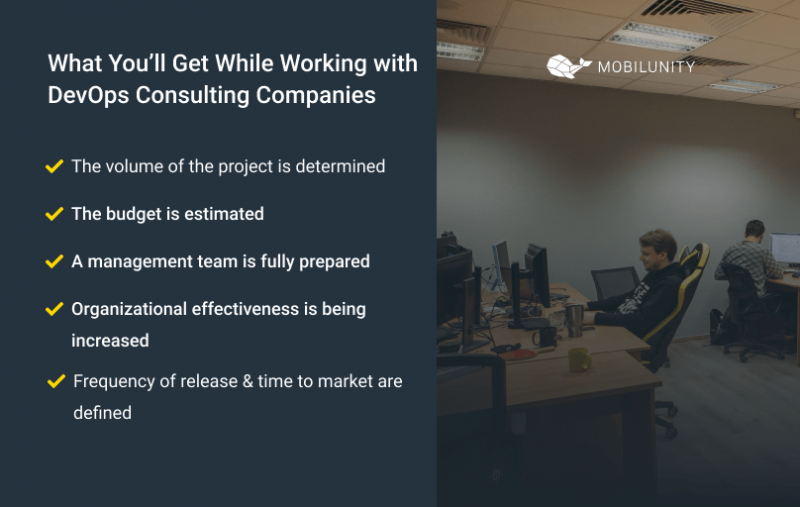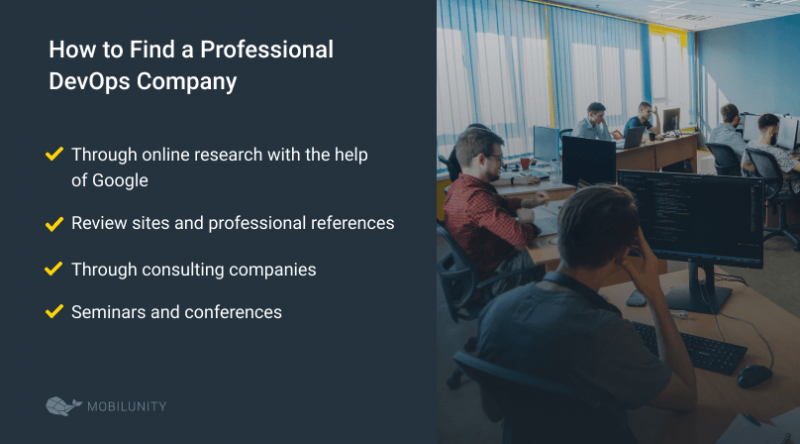DevOps or Development Operation is a set of practices that are meant to improve the efficiency of software development and operation through the integration and active cooperation of experts using automation tools. Development Operations emerged as another step towards optimizing interactions in small teams to increase the speed of the production process.

The idea of DevOps arose back in 2000 when the IT world faced a massive problem with a lack of synchronization of work processes. The regular operation of the software product was obstructed due to the functional and organizational separation of programmers and those who deploy and maintain it. The DevOps concept offers a solution to this issue by applying Agile systems not only to development but also to software operation processes. Thus, one of the many reasons for the rising DevOps consultant services popularity was the spread of Agile practices concentrated on accelerating the distribution of a product and increasing the number of versions.
In the modern world, the DevOps methodology can be helpful for almost any organization involved in developing applications or managing large numbers of servers.
Main Benefits of Using DevOps in eCommerce
These days customers are the ones who dictate the rules by which online stores run their business. There are plenty of choices out there, so customers don’t have to wait until a store fixes its processes or finally adds new features. That is why the majority of eCommerce projects for IT have the following demands:
- Short release cycle;
- Fast troubleshooting and bug fix;
- Stability of the service;
- Increased data security;
- Compatibility with AI / ML technologies.
These requirements can only be achieved if the workflow is running smoothly, so hiring a DevOps team is instead a necessity in this case. Here are some of the main benefits a DevOps consultant can bring to the eCommerce business:
- Continuous integration and delivery. Speed of execution and overall agility is what makes companies competitive in the market. With a relevant CI/CD pipeline design, they can receive customer feedback and analyze it. This technology will also reduce backload on the QA team and allow them to take care of more global and essential tasks.
- Automation of the infrastructure. With changes implied within only a couple of seconds, customers won’t have to wait too long for any malfunctions to be fixed. Such a move can also lower the maintenance of the whole company’s infrastructure. It will also let the development team focus more on improving already existing technologies rather than trying to keep them working.
- Increased security. It is crucial to protect the clients’ data if an online store wants to keep having customers. Such an approach also allows building strong GDPR compatibility, therefore, making the store even more trustworthy.
- Constant monitoring. With a DevOps engineer on your team, you will be able to eliminate threats long before they cause any damage to your functionality. Automation can also be a big help in detecting possible traffic spikes and preparing the infrastructure beforehand.
DevOps For eCommerce Business Optimization
DevOps is a concept, a particular set of tools and guidelines for their use. DevOps has several levels of implementation, which are rated on a scale from 1 to 5. “One” is the automation of building code in the development environment, manual testing, and deployment, with a release frequency of a week or more.
The ideal “five” corresponds to a micro-release and even non-release approach, when each line of new code automatically goes through all the stages of verification, almost instantly getting into production.
Even IT leaders in DevOps, such as Google, do not have a clear “top five.” In this light, each company must clearly understand its business needs from DevOps and realistically look at the starting points, goals, and resources available in terms of functionality, organization, ideology, and culture. Further, under this vision, tools are selected and “sharpened” from the pool in approximately 300 existing DevOps-compatible solutions.
Ways DevOps Can Help eCommerce Teams Achieve Their Goals
Using even the most basic DevOps tools can bring tremendous positive effects to your daily workflow. By hiring DevOps consultants, you will open yourself to a whole new amount of opportunities such as the following:
- Your teams will be pushed even more to constant changes. Eventually, even the slightest changes will be implemented faster and with a minimum amount of effort. You will also get more security and reliability from such implementations in the long run. Also, in case of any mistakes or malfunctions, you will always be able to return to the previous version and fix everything.
- You will get reduced development costs. The most popular DevOps practices can allow IT companies to produce more complex and affordable products with increased convenience for the end-user.
- DevOps practices can be used by consumers as well. Cloud solutions could be a great example of this statement as they are a combination of the development product phase and a consumption one at the same time. For example, CRM systems that are based on cloud technology are developed this way so that they could immediately be used by end-users. In the end, companies can reduce their infrastructure development expenses and receive regular updates.

Source: Mobilunity
Main DevOps Tools
As the DevOps technology evolved, new tools have been developed. Below you can find some of the most popular ones to use.
1. Slack
Slack is currently one of the most popular communication tools for many companies. One of its best features is a chance for developers to use the toolchains in the environment they are using for communication with members from other teams and departments.
2. Docker
With Docker, you will be able to securely run, deploy, or package any application regardless of its running environment. You will also be able to access the information on every application remotely. Eventually, you will make your infrastructure development process more affordable.
3. Jenkins
With this integration server, it will be much easier for you to build a development cycle for your product. You will be able to automate most tools that take part in the SDLC and increase your team’s input.
4. Phantom
Splunk® Phantom is a tool that provides security orchestration, automation, and response. It’s a great help for DevOps developers that want to create a secure and defensible infrastructure at the early stages of the system development life cycle.
5. Nagios
Nagios also belongs to the monitoring tools category similar to Phantom. But, it is more suitable for large enterprises or companies with a well-developed IT infrastructure – dozens of servers, routers, etc. If any fault occurs, Nagios will notify DevOps specialists immediately.
6. Vagrant
This is a tool for those who are working with virtual machines in a single testing and deployment workflow. Vagrant is a tool for maintaining the consistency of testing environments for particular projects across all machines used.
7. Ansible
Ansible is a fantastic open-source platform for configuration management and application deployment that enables infrastructure as a code. The platform allows configuring an entire network of computers at once, with little to no programming skills.
8. GitHub
GitHub is by far one of the most well-known and reputable code hosting platforms for version control and collaboration. As a user of the platform, you can work together with other contributors on projects from anywhere in the world due to the platform’s accessibility.

Source: Mobilunity
The Role of DevOps Consultant in the eCommerce Industry
At some point in their growth stages, companies of various sizes and industries would require consulting services to progress into the next phase of their development. Whether you are running a startup or a mature enterprise, DevOps consultancy will help you achieve critical business milestones and expand them by developing new solutions and resolve technical challenges, from automated testing to centralized log management. By leveraging the DevOps consultant’s expertise or IT consultancy, you will be able to boost efficiency and solution delivery time by optimizing and minimizing development cycles while maintaining the quality and consistency of the code. Using Agile methodologies, you can also improve collaboration between teams working on the same project. DevOps methodologies the consultant can help implement are in place to streamline the working process making it clear and understandable to you as a client. By combining DevOps and Agile methodologies, you will get an ideal combination of deliverability and quality.
Typical Rates of DevOps Consultants and How to Hire Them
If you need a DevOps consultant, you probably already have a developed product. The tasks performed by DevOps consultants can revolve around the development process as well. However, such specialists should report to a senior or team leader who, through the version control system, makes a code review, checks, and approves the PR / MR. And you definitely shouldn’t trust architectural issues to a person without proven architectural experience. Better to look for third-party expertise for a safety net.
Before jumping into decisions, it is best to learn about DevOps consultant cost first. Here are some numbers for your consideration.
| Canada | UK | USA | Ukraine | France | |
| $ per year | $97,031 | $52,738 | $111,895 | $16,800 | $69,927 |
Final Thoughts
DevOps practices have become the standard for effective product development, and no Agile project can be complete without them. The demand for their implementation continues to grow as businesses’ needs for new products and new functionality evolve. This process is, in fact, endless, which means that everyone who relies on digitalization and innovative growth strategies will have to accept DevOps as the primary methodology.
Author Bio:
Kateryna Boiko is a Marketing Director at Mobilunity, Provider of Dedicated Development Teams with 9 years of hands-on experience in digital marketing. Kateryna managed to work with diverse industries and markets and now is keen on sharing unique cases with the world and coach on topics relevant to Web Analytics and Search Engine Optimization.




